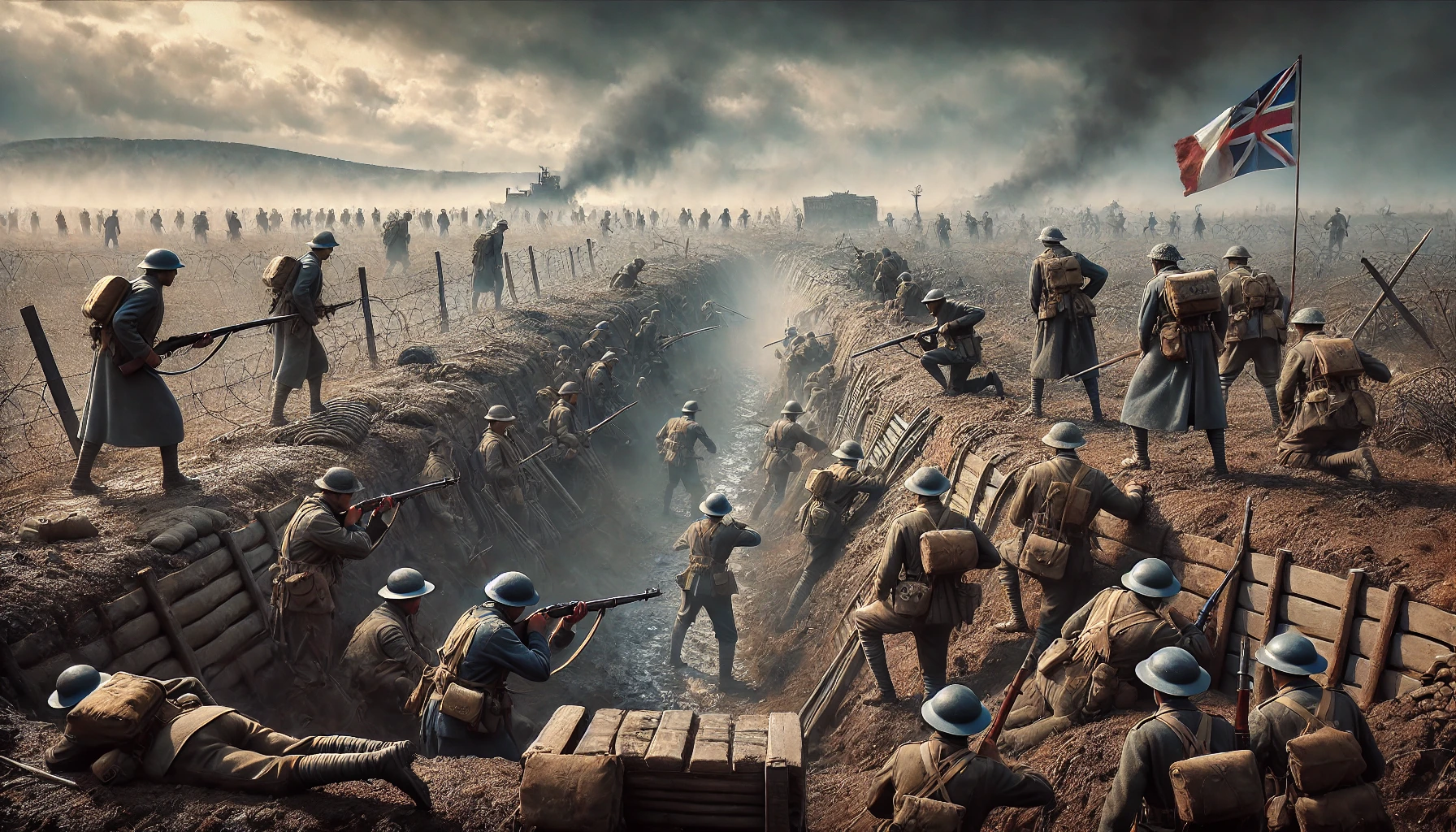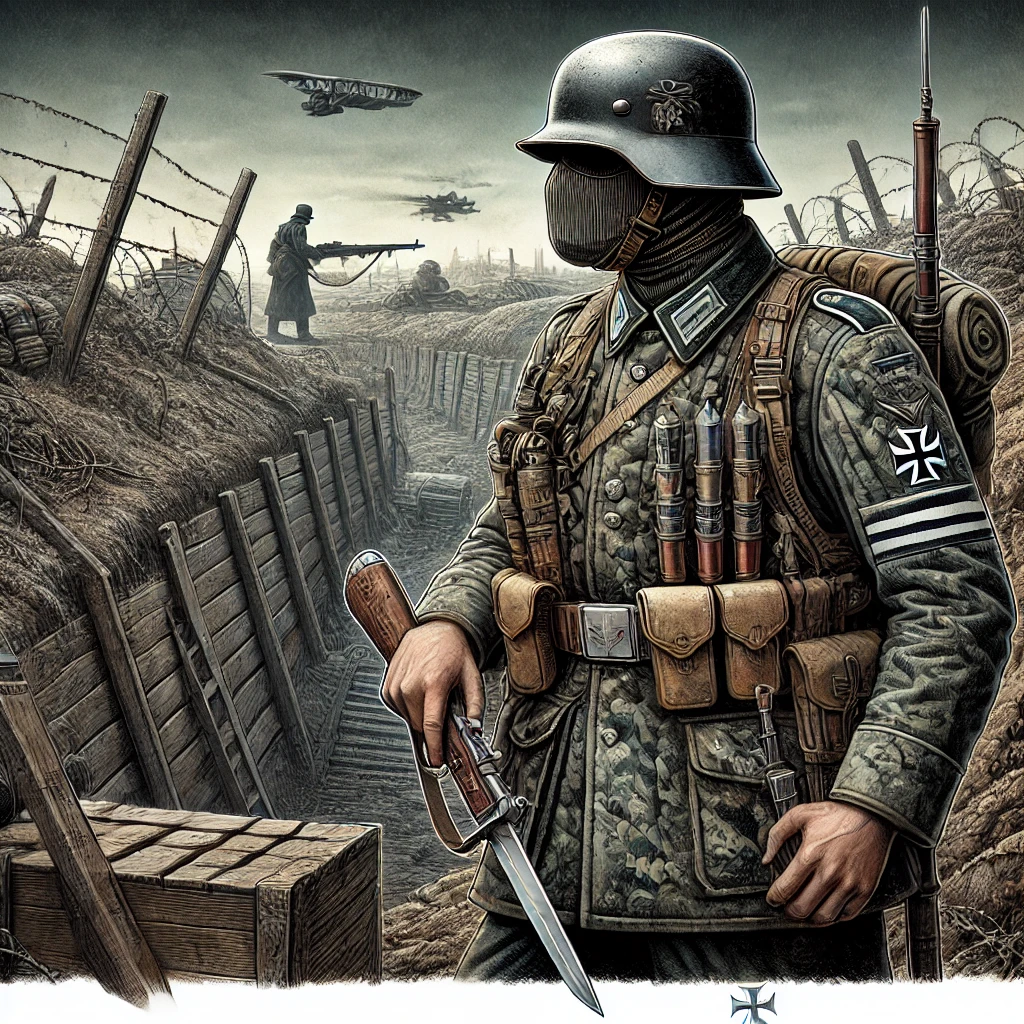A World at War
The first five weeks of the war saw great offensives by Germany, Russia, and Austria-Hungary, larger than any military operations in history. Hundreds of thousands of men died, but today, all of those offensives came to an end.
At the beginning of the week, the French and the British were regrouping around Paris as the Germans advanced. The Germans were also advancing in the east, hoping to push the Russians back to Russia, while further south, it was the Russians advancing to push the Austrians back toward their empire. Two weeks ago, a Russian army had been absolutely destroyed at the Battle of Tannenberg. Though the Germans had tried to press their advantage, there hadn’t been a major battle since then. That changed this week.
The Eastern Front: Germany’s Triumphs at Tannenberg and Masurian Lakes
On the morning of September 9th, the German army, bolstered by troop arrivals from the front in France, attacked the Russians and once again crushed them at the Masurian Lakes. The Russian army escaped complete destruction only through the remarkable speed of its retreat, moving 40 kilometers a day to leave the Germans far behind.
These two battles, especially Tannenberg, were truly historic victories. They pushed all Russian troops off German soil and destroyed Russian numerical superiority over the Germans for the time being. Russia would still have a strong presence just across the border, but the Germans were no longer worried about being overrun by the endless Russian army.
Russia’s Victory in Galicia: Austria-Hungary’s Humiliation
Here’s a little anecdote from the retreat: some Russian soldiers tried to take a statue of Bismarck from a town in East Prussia to bring home, but their commander told them not to, as he didn’t want to cause an international incident. Though the Russian people might have been demoralized by the catastrophic defeats against Germany, they had simultaneously beaten Austria-Hungary nearly as badly in the Battle of Galicia, which ended on September 11th.
This was a group name for a series of battles over several weeks during Austria’s offensive into Russian territory. These battle ended with Russia taking 130,000 prisoners and inflicting 324,000 Austrian casualties. Yes, you heard that right. The Austrian army, under Chief of Staff Conrad von Hotzendorf, attacked with a much smaller force than the Russians. The failure was due more to Austrian incompetence than Russian brilliance.
The Austrian army was forced to retreat 160 kilometers toward the Carpathian Mountains. Conrad’s failure and humiliation were now total. He bore significant responsibility for the beginning of World War One and all the carnage that followed.
The Pact of London: A Promise to Fight Together
At one point, Conrad confessed to his staff that if Archduke Franz Ferdinand were still alive, he would take the man responsible for such military disaster—Conrad himself—out and have him shot.
It was also this week that saw the Pact of London, where France, Britain, and Russia agreed that none of them would make a separate peace with Germany or Austria-Hungary. They would fight to the end.
The Western Front: The Road to the Marne
In the Western Front, it seemed like the end might be near. The Germans had advanced toward Paris for two weeks, and the final battle of that offensive was approaching.
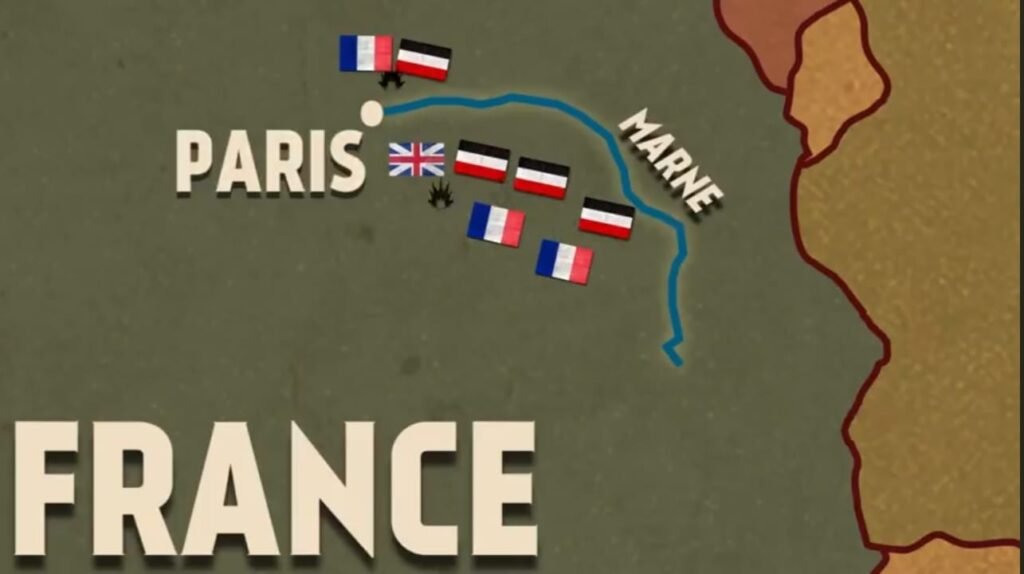
As they neared Paris, the French were finally gaining an advantage. In spite of their massive losses over the past three weeks, they had a newly recruited and formed army, while the exhausted Germans had been advancing for 33 straight days. The Germans, having followed the retreating British not to Paris but just northeast, south of the river Marne, were overextending their supply lines and losing the chance to take Paris, which was the major goal of their battle plan, The Schlieffen.
The Battle of the Marne: A Turning Point
The Battle of the Marne began on September 5th, 1914. A battle that the French and the British absolutely could not afford to lose. Over two million troops were engaged. The French used the railways to outmaneuver the Germans, while the Germans, suffering from poor communication, struggled. Moltke, the German army Chief of Staff, practiced a system of decentralization, where his generals often acted independently.
By this point, Moltke had become mentally strained, frequently talking to himself and writing anxious letters to his wife where he would freak out about the amount of blood spilled in the war and the feeling he must personally answer for it. It’s pretty amazing when you realize that the Germans got this far when their generals often had no idea what the others were doing.
A New Kind of War: The Birth of Trench Warfare
Despite their disorganization, the Germans advanced remarkably far. During the entire Battle of the Marne, the German High Command issued no orders, and the last two days didn’t receive any either. Von Bulow, commanding the western German army, was forced to defend against French advances by making a new north-south line facing Paris. His counterattack created a gap between his army and the eastern army under von Kluck.
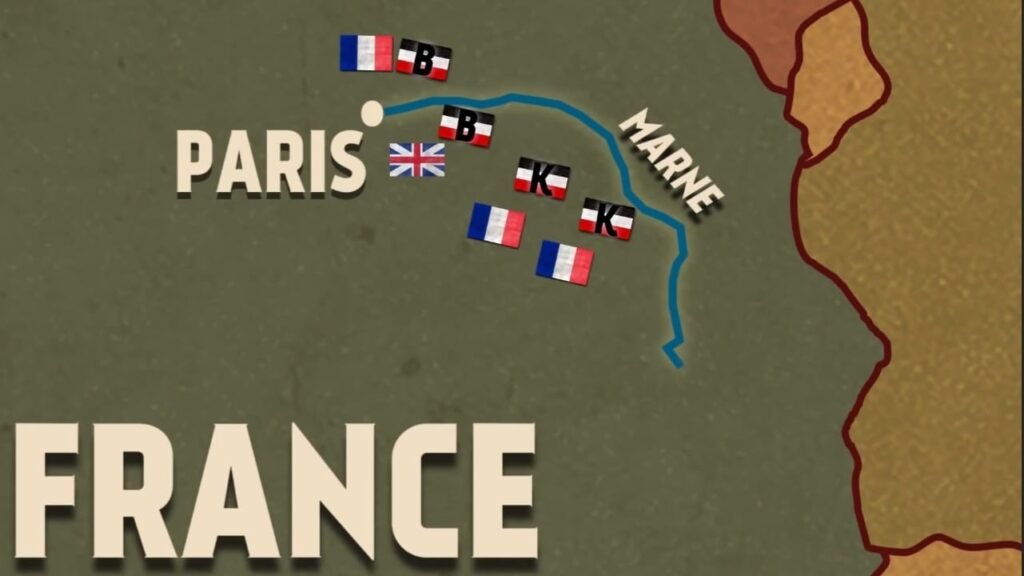
The British Expeditionary Force advanced into this gap. The French General Joseph Gallieni did something unprecedented: he requisitioned all the Paris taxicabs to shuttle reserves 50 kilometers from the city to the front. Although the impact was modest, it was an extraordinary move for the time.
On September 8th, the battle, and you could argue, the whole war, and even the whole 20th century hung in balance. Attack and counterattack, all across the line, and it was simply a question of who would crack first.
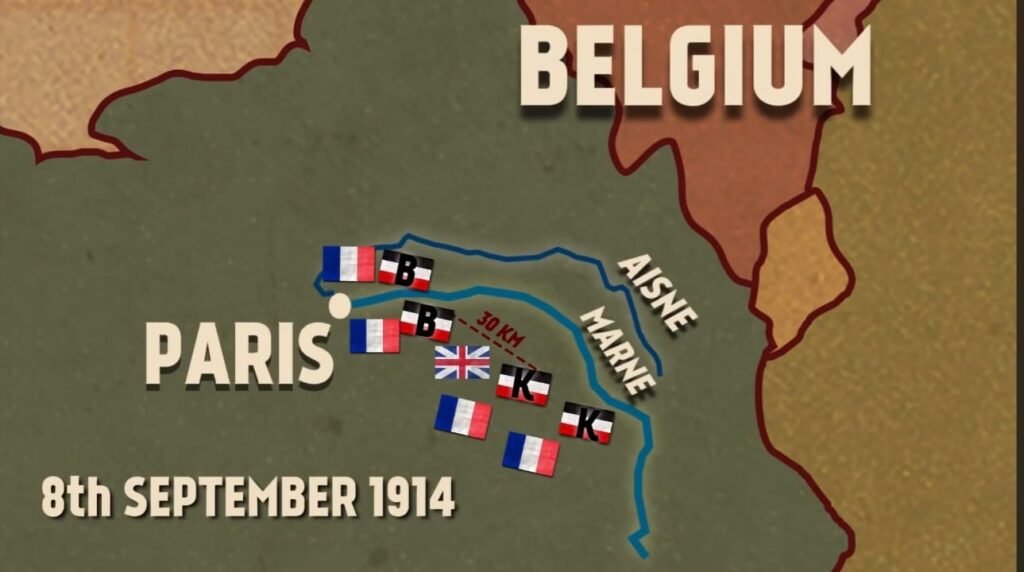
It was a night attack on the 8th, when the French captured Marchai-en-Brie that really turned the tide. When von Bulow fought back, the gap between his army and von Kluck’s grew to nearly 30 km, he was outnumbered, the British were now well into the gap, and in the wee hours, von Bulow gave the order to retreat. At 9:02 AM on September 9th, 1914, the German forces began to withdraw.
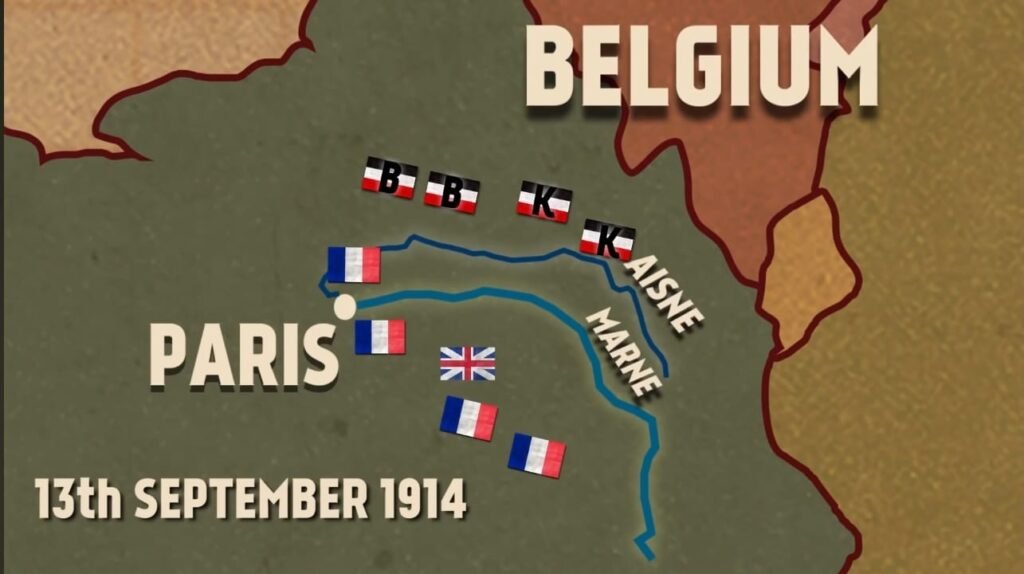
Casualties and Consequences: The Toll of Five Weeks
On September 9th, the Germans were driven back across the Marne and on the 13th across the Aisne, a total retreat of 100 kilometers. It was there on a ridge that the German troops dug in, and we see now one of the unsung military advances of the war, the spade, in action.
The Germans used it; the French did not, so the Germans could dig in: not so the French. There’s no telling how many thousands of Frenchmen were lost to the German advance because of such a simple tool. A man in a hole is impossible for artillery to spot, and can’t be shot by a rifle, and hand grenades would require close contact. For many Frenchmen, though, using such a defense was a dishonorable means of conducting a battle. They would soon learn that honor had no place in modern warfare. That modern warfare had now cost close to one million lives in only five weeks, and during the first few months of the war, an average of over 15,000 lives were lost every day.
The Fall of Moltke: A Shattered Leader
On September 14th, a shattered Moltke was removed from the German command. He had in the end found the casualties unbearable, and looking at the few orders he issued the last two weeks of his command, you can see him slowly falling to pieces, but it’s hard to have sympathy for him; no man on earth, not even Conrad, had done more to bring about the war than Moltke, but he proved incapable of commanding his nation’s armies.
The War’s New Reality: A Stalemate on Two Fronts
Three great offensives were over this week, and much of the pattern was set for the rest of the war. I’m going to end this blog with a quote from the historian Martin Gilbert to tell you how:
“Denied their triumphal entry into Paris, the German army would go on fighting on the Western Front for another four years, as hopeful of victory in August 1918 as they had been in August 1914. But the hopes of a month earlier of being able to defeat France in a knockout blow and then turn all their military strength against Russia had been dashed. The war of rapid victories had become a strategy of the past, and a dream for the future. Germany was going to have to fight simultaneously, and with constant danger, in both east and west.
France was going to have to fight on French soil. Russia was going to have to regain land in the west and Austria to regain land in the east. Christmas was still three and a half months away, but every warring state was going to have to search for new strategies, and even new allies.”

